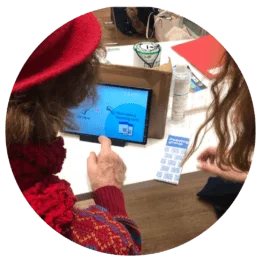Scoping
Objectives of scoping workshop
- Introduce London boroughs, VCS organisations and health partners to the project and scope out the potential opportunities and barriers
- Learn from insights and previous experiences so that we can create three initial ideas for co-design projects
Participants
Colleagues from a number of London boroughs, VCS organisations and health partners attended the workshop.
Group exercises
We shared details about the project, including the Community Makers initiative that it builds upon, then participants were invited to discuss the following questions in small groups:
- What have you done in this area before?
- What are the biggest challenges of working in this area?
- What are the economic or commercial factors?
- Which approaches are most exciting?
- What do you want to see piloted or tested in the project?
- Who could we involve in making that work?

Example of activity sheet used in the workshop
Learnings
The workshop identified opportunity and challenge areas based on the learnings from previous projects carried out by the participants. It also aided our understanding of the potential scope for the project and highlighted possible partners for collaboration. Our insights and learnings from the workshop included:
What are the biggest challenges of working in this area?
- Funding
- Measuring impact (many of the benefits are intangible)
- Ensuring that an already vulnerable group is not further disadvantaged by costly innovations
- Moving from a pilot to a sustainable service
- Deciding which products to trial
- Reaching people who do not have family or other support locally
- Lack of devices and connectivity
- Low user confidence and capability
- Technology could be more adaptable for users
- Technology is not a ‘fix-all’ solution – people take time to adapt to new technologies
What are the economic or commercial factors?
Opportunities
- Local authorities are prioritising tackling loneliness and isolation to prevent later mental health issues and reduce the need for long-term support services
- Digital inclusion and isolation projects can be merged
- Boroughs could lead on the use of new technologies
- Innovative initiatives could save service providers money and reduce the risks of not having sufficient carers in the coming years
- Many organisations want to resolve the same issues so there is an opportunity to connect with these organisations to reduce duplication and resource the gaps
- Virtual Reality (VR) technology could allow people to access external opportunities from their own home, which would reduce costs and risks
- Building community resilience would enable organisations and individuals to cope with future social changes (e.g. further lockdowns)
Barriers
- Funding – the funders of services expect a high reach but, in the case of dementia, more intense and long-term support is required for lower numbers of people
- Consistent funding is a challenge so pilot projects are not being sustained
- Self-funded care is not always affordable
- Many outcomes are not easily measurable
- Lack of resources
- Stakeholder buy-in
- Poor evaluation and push from private companies means that the ‘flashiest’ technology overshadows the technology that best suits the people using it


